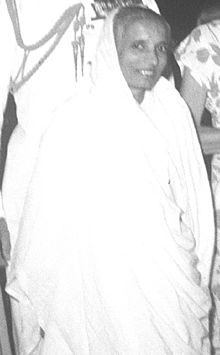Maniben Patel

Maniben Patel (3 April 1903 — 26 March 1990) was an
Early life
Patel was born on 3 April 1903 at
Borsad movement
In 1923-24 the British government levied heavy taxes on the common people and for recovery of the same they started confiscating their cattle, land and property. To protest against this oppression, Maniben motivated women to join a campaign led by Gandhi and Sardar Patel and support the No-Tax Movement.[2]
Bardoli Satyagrah
Exorbitant taxation was levied by the British authorities on the peasants of Bardoli in 1928 and they endured similar harassment to those of Borsad. Mahatma Gandhi directed Sardar Vallabhbhai Patel to take leadership of the Satyagrah. Initially women were reluctant to join the movement. Patel, along with Mithuben Petit and Bhaktiba Desai, motivated women who ultimately outnumbered men in the movement. As part of the protest they stayed in huts erected on land confiscated by the government.[2]
Rajkot Satyagrah
During 1938, a Satyagrah was planned against the unjust rule of the Diwan of Rajkot State. Kasturba Gandhi was keen to join the Satyagrah despite her poor health and Patel accompanied her. The government passed an order to separate the women. She went on a hunger strike against the order and authorities allowed her to reunite with Kasturba Gandhi.[2]
Non-cooperation movement

She participated in the
Principles
Patel always ensured that her and her father's clothes were weaved from khadi threads which were spun by her. She always insisted on travelling in third class.[2]
Electoral career
- 1952 : Won South Kaira (a.k.a. Kheda) Lok Sabha seat in General Elections, as Congress candidate
- 1957 : Won Anand Lok Sabha seat in General Elections, as Congress candidate defeated Amin Dadubhai Mulji[3]
- 1962 : Lost to Narendrasinh Ranjithsinh Mahida of Anand Lok Sabha Seat, as Congress' candidate[4]
- 1964 to 1970 : Congress Member of Rajya Sabha
- 1973 : Entered Lok Sabha winning the by-poll from Sabarkantha as Congress(O) candidate, defeating Shantubhai Patel of Congress [5]
- 1977 : Won Mehsana Lok Sabha seat in General Elections defeating Natvarlal Amratlal Patel, as Janata Party candidate[6]
Vice president
Patel was once Vice President of the Gujarat Provincial Congress Committee. Later, she was elected as a member of the
She was elected to
She was connected with several educational institutions including the Gujarat Vidyapith, Vallabh Vidyanagar, Bardoli Swaraj Ashram and Navajivan Trust prior to her death in 1990.
In 2011, the Sardar Vallabhbhai Patel Memorial Trust undertook a project to publish her Gujarati diary, in collaboration with Navajivan Publications.[10][11]
Works
- Inside Story of Sardar Patel: The Diary of Maniben Patel, 1936-50, by Manibahen Patel. Ed. Prabha Chopra. Vision Books, 2001. ISBN 81-7094-424-4.
References
- ISBN 978-81-7099-513-5.
- ^ ISBN 81-237-3766 1.
- ^ "Statistical Report General Election Archive, 1957 (Vol I, II)". Election Commission of India. Retrieved 9 November 2020.
- ^ "Statistical Report General Election Archive, 1962 (Vol I, II)". Election Commission of India. Retrieved 9 November 2020.
- ^ "The political dynasty nobody is talking about: Sardar Patel's". 31 October 2018.
- ^ "Statistical Report General Election Archive, 1973 (Vol I, II)". Election Commission of India. Retrieved 9 November 2020.
- ^ "Archived copy" (PDF). Archived from the original (PDF) on 4 April 2014. Retrieved 2 June 2014.
{{cite web}}: CS1 maint: archived copy as title (link) - ^ "Archived copy" (PDF). Archived from the original (PDF) on 8 October 2014. Retrieved 3 August 2015.
{{cite web}}: CS1 maint: archived copy as title (link) - ^ "Lok Sabha Website Members Biodata". Archived from the original on 11 March 2016. Retrieved 2 August 2015.
- ^ Vashi, Ashish (8 June 2011). "Knowing Sardar Patel through his daughter's diary". The Times of India. Ahmedabad. Archived from the original on 8 July 2012. Retrieved 2 June 2013.
- The Tribune. Retrieved 2 June 2013.
